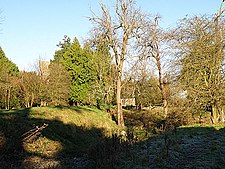English Bicknor Castle
| English Bicknor Castle | |
|---|---|
| English Bicknor in Gloucestershire, England | |
 The castle ruins today | |
| Coordinates | 51°50′19″N 2°36′31″W / 51.838611°N 2.608611°W |
| Type | Motte and bailey |
| Site information | |
| Condition | Earthworks only remain |
English Bicknor Castle was a castle in the village of English Bicknor in Gloucestershire, England.
The castle was built in the 11th century as a motte and bailey design, although some suggest a later construction date in the early 12th century.[1] The motte lay at the centre of two concentric outer bailey walls, producing a roughly circular castle approximately 150 yards across.[2] The motte was placed against the south-west corner of the site, where the ground fell away from the castle, giving additional protection from attack.[2] A square stone keep may have been built at a later stage on the motte, and a church was built in the outer bailey.[2] At the start of years of the Anarchy the castle was controlled by the powerful Miles de Gloucester.[3] The castle escaped destruction at the end of the conflict and was still in use at the beginning of the 13th century, when it was owned by William Avenel; its exact date of final ruin is unknown.[4]
See also
[edit]References
[edit]Bibliography
[edit]- Amt, Emilie. (1993) The Accession of Henry II in England: royal government restored, 1149-1159. Woodbridge, UK: Boydell Press. ISBN 978-0-85115-348-3.
- Renn, Derek Frank. (1968) Norman castles in Britain. London: Baker.
- Rushforth and Knowles. (1931) "Proceedings at the Spring Meeting at Micheldean, Goodrich, English Bicknor and Newland Archived 4 October 2011 at the Wayback Machine," in Transactions of the Bristol and Gloucestershire Archaeological Society, 1931, Vol. 53.

